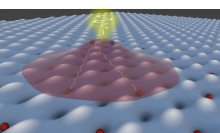UW News has posted a story about advancements in quantum materials by a team led by researchers at the University of Washington, the University of Hong Kong and the Pacific Northwest National Laboratory. In a paper published on April 20 in Nature, the team reports that light — from a laser — can trigger a form of magnetism in a normally nonmagnetic material. This magnetism centers on the behavior of electrons “spins,” which have a potential application in quantum computing. Scientists discovered that electrons within the material became oriented in the same direction when illuminated by photons from a laser. By controlling and aligning electron spins at this level of detail and accuracy, this platform could have applications in quantum simulation and other fields.
The team was co-led by Dr. Xiaodong Xu at the UW, whose research team spearheaded the experiments, and Dr. Wang Yao, professor of physics at the University of Hong Kong, whose team worked on the theory underpinning the results. Dr. Xu is Boeing Distinguished Professor at the UW in the Department of Physics and the Department of Materials Science and Engineering, and scientist at the Pacific Northwest National Laboratory. He is also a faculty researcher with the UW’s Clean Energy Institute, the Molecular Engineering & Sciences Institute and the Institute for Nano-engineered Systems. Other UW faculty members involved in this study are Dr. Di Xiao, a UW professor of physics and of materials science and engineering who also holds a dual appointment at the Pacific Northwest National Laboratory, and Dr. Daniel Gamelin, a UW professor of chemistry, director of the Molecular Engineering Materials Center, and faculty member in the Clean Energy Institute and the Molecular Engineering & Sciences Institute.
Lead author on the Nature paper is Dr. Xi Wang, a UW postdoctoral researcher in physics and chemistry. Additional UW co-authors are Heonjoon Park and Jiayi Zhu, both doctoral students in physics, and Chong Wang, a researcher in materials science and engineering.
